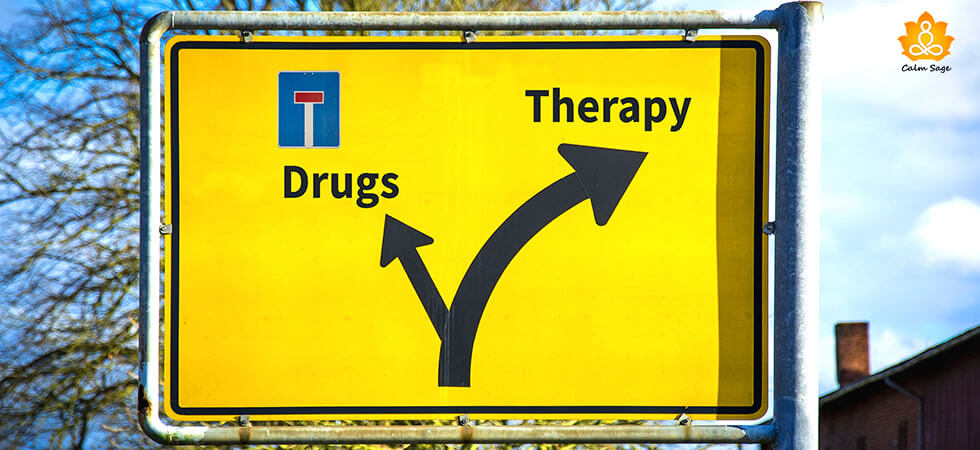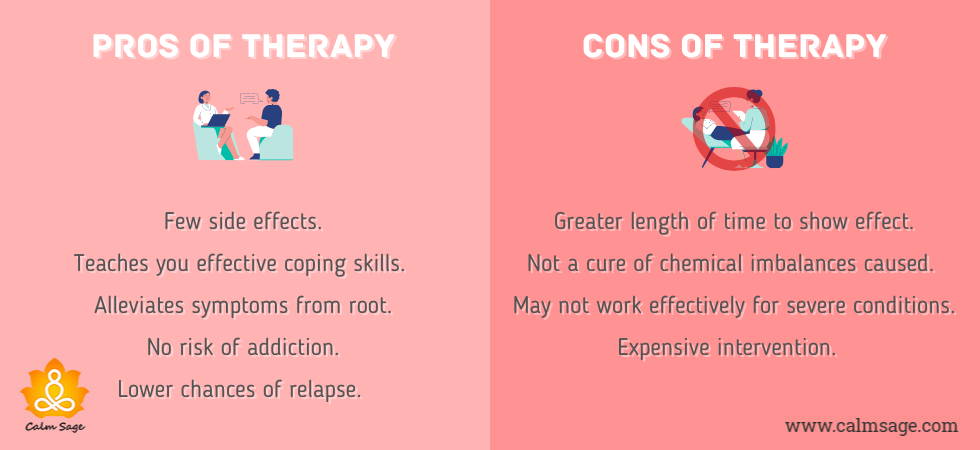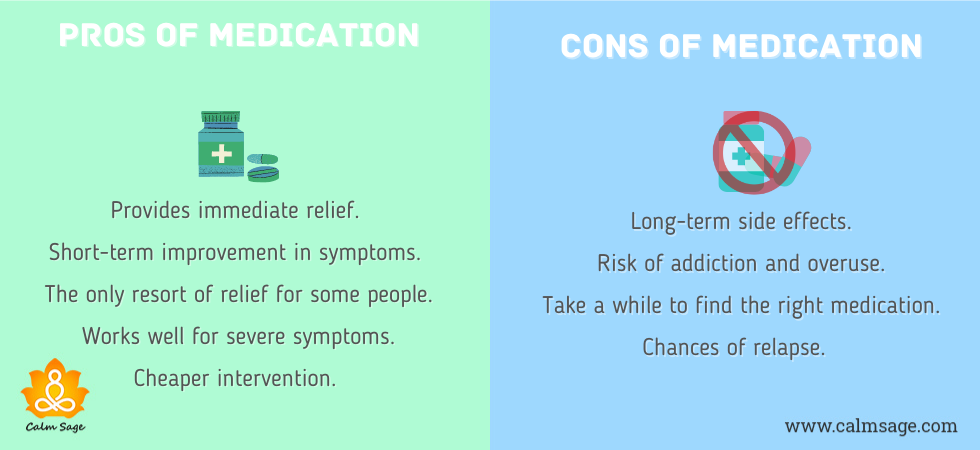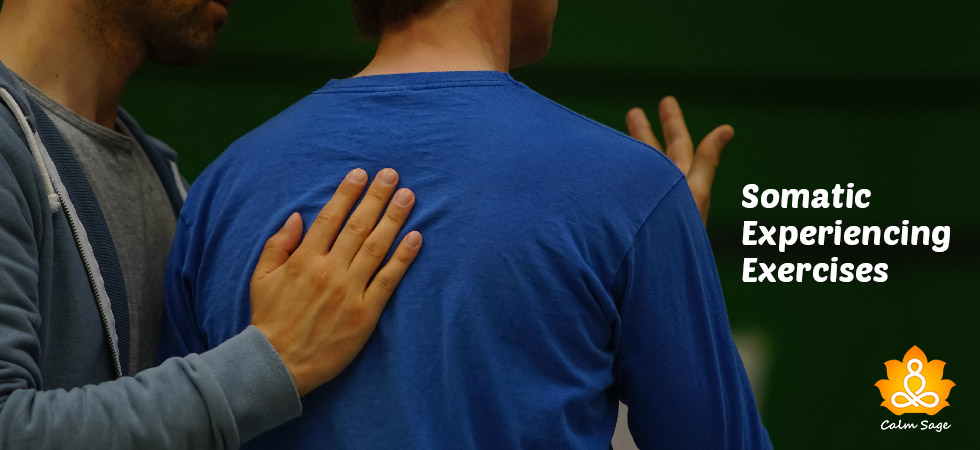Therapy vs. Medication: The Best Choice For Your Mental Health Condition
Therapy vs. medication, which treatment approach is best going to work for your mental health condition. Let us find out!

When an individual decides to seek help from a mental health professional there are multiple important decisions that line up in their way. From deciding which mental health professional to contact, to whether to seek help online or offline.
One such big decision that an individual seeking help for his mental health condition has to make is: whether to go for a therapy-based or medicine-based intervention! After all, which one is going to work the best and offer the best results.
The debate between these two treatment approaches has been around for quite a while now. Let us explore each side of the tug of war- Medication vs. Psychotherapy and find our answers!
Therapy Vs. Medication: Basic Difference
Before we start analyzing how medication and therapy work for particular mental health conditions let us understand both of these interventions individually and in detail.
Therapy: Talk therapy has been found to benefit both children and adults across a broad range of mental health conditions. Through therapy, one discovers the hidden and root cause of their problems, learns effective ways to deal with it, and becomes self-dependent in life.
Here factors like the relationship between you and your therapist have a big role to play in predicting the positive outcomes. .
Pros and Cons of Therapy
Below we have listed the pros and cons that therapy has to offer to an individual:

Medication: The symptoms of a particular mental health condition results from a chemical imbalance in the brain. Medication helps to improve this balance and reduce these symptoms eventually. For many mental health conditions medication is the fastest way to get relief in symptoms.
Pros and Cons of Medication
Here are some reasons that address the positive and negative sides of medication.

Fact Check: Interestingly a study found out that the number of people seeking therapy has reduced over time and when people were asked what would they prefer: Therapy or Medication, they preferred Psychotherapy!
Therapy Vs. Medication For Anxiety
Different research findings have shown that both medication and therapy work for anxiety. However, the best treatment approach for you can be decided based on the severity of your symptoms and your preference.
Medication for Anxiety:
Different kinds and combinations of drugs are used in treating anxiety like sedatives and antidepressants. Generally, people benefit from these medications as prescribed by the psychiatrist. However, in some cases certain side effects are likely to accompany, like:
- Blackout episodes if medication is used with any form of substance.
- Increased impulsivity.
- Development of dependency on the drug leading to addiction.
Therapy for Anxiety:
Multiple studies have shown that talk therapy works effectively well in the treatment of anxiety. Some researchers have also supported that therapy can be even more effective than medication while treating anxiety.
Interestingly, a study in 2016 found that Cognitive Behaviour Therapy can improve the signs of anxiety among those who are resistant to respond to standard pharmacotherapy. This shows that Therapy like CBT and its type can help an individual deal with anxiety.
Therapy Vs. Medication For Depression
Similar to anxiety, depression too can be treated via therapy, medication, or a combination of both. In fact, most researches that have been carried out across these lines have studied the impact of therapy and medication on depression only.
Medication for Depression:
Antidepressants are the most prescribed drugs in the treatment of depression. They are usually prescribed to people with mild or severe symptoms of depression.
The use of ADMs (antidepressant medications) has made more people come and seek treatment for depression (according to stats). The fact that medication is effective in treating depression makes it a considerable option.
Therapy for Depression:
While antidepressants can help you feel better with the signs of depression therapy can help you with dealing with the underlying cause(s) of it. The first line of treatment usually preferred by mental health professionals is therapy.
In a study, it was also seen that relapse from chronic depression is best treated via mindfulness-based cognitive therapy (MBCT) when compared with ADMs. These studies combined suggest that therapy does help in bringing relief to depression.
Final Verdict: As there is no single finding that supports medication over therapy or vice-versa the decision of choosing between the both for depression lies on other factors.
The one factor that you can consider is The time you can invest! If you can’t invest much of your time, go for antidepressants, but if you wish to eradicate the issue from its root, psychotherapy should be your preference.
Therapy Vs. Medication For Mental Health Conditions In Children
Different factors of a child’s mental health diagnosis determine whether therapy is the best choice of treatment or is it the medication that will work well. Usually, a combination of therapy and medication is used for the best outcomes.
Medication for Children’s Mental Health Conditions:
Some safe medications in optimal amounts can bring relief in a child’s symptoms. However, prescriptions of some heavy drugs have received backlash! The long-term impact of medication on kids’ mental health (especially those with ADHD diagnosis) is still being evaluated.
Therapy for Children’s Mental Health Conditions:
Therapy is found to be an effective method to help a child deal with his behavioral and emotional problems. The therapy often involves the family as well so that they can support the child throughout the treatment journey and offer him a safe environment.
Final Verdict: As the long-term effects of medication are yet to be understood, the first line of treatment for kids should be behavior therapy.
With their age being tender enough to learn and relearn things, behavior therapy can help in many ways (including emotional aspects). However, a combination of both can also be applied to look at the symptoms.
Psychotherapy vs Medication: Combination Of Both
While the debate that we have been addressing so far is choosing between psychotherapy and medication, let us now consider the benefits of their combination in treating different mental health conditions.
Note: All the pointers discussed below are from the conclusion of various studies that have been conducted to study the effectiveness of therapy and medication on mental health conditions.
The most effective treatment approach for depression as suggested by a meta-analysis of several studies and findings of individual studies is a combination of antidepressant medications and psychotherapy. The two therapies that have been most popularly linked with positive changes in a person diagnosed with depression are CBT and interpersonal therapy.
For eating disorders, medical management is suggested for maintaining the physical safety of an individual. However, the core reasons behind the same are best addressed and eradicated with the help of talk therapy. Multiple studies have suggested that eating disorders can be effectively treated when an individual receives both forms of treatment over one treatment alone.
People with bipolar disorder and schizophrenia have shown improved overall condition when the medication was added to their therapy-based treatment. The medications preferred here are mood-stabilizing and antipsychotic drugs, and preferred therapies are CBT and family psychotherapy.
The functionality of drug and alcohol abusers has shown to improve over time when both therapy and medications are used together, then one treatment alone. Environment-based therapy and the famous 12-step support program are proven to work effectively here. When it comes to medication, they help in reducing the cravings for particular drugs in an individual.
Apart from the mental health conditions discussed above few studies have suggested the combined treatment approach for conditions like Obsessive-compulsive disorder, Major depression, and panic disorder as well.
Author’s Take:
To sum it all up I have to say that if your mental health condition is non-psychotic which means you are still in touch with reality, then therapy can help you work through your symptoms. However, if the intensity of the symptoms is too high that you are dependent on others for your daily life functioning, a combination of both medication and treatment will help you here.
Next, if your mental health condition is from the psychotic category (loss of connection with reality) then, both medication and therapy are the best intervention for you.
Rest, just take the first step and see how your assessment goes and let your professional decide the best for you.
Thank you for reading!




















